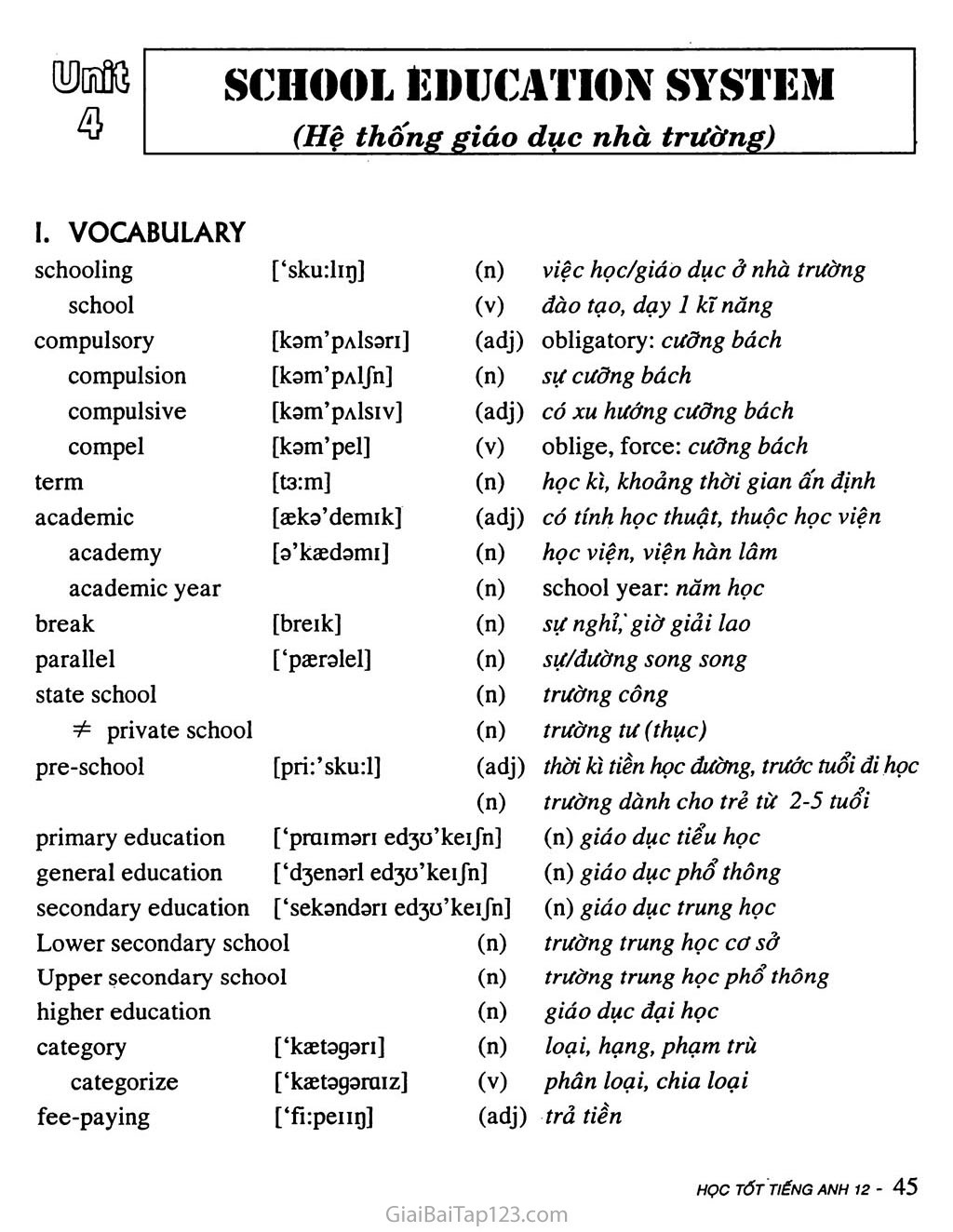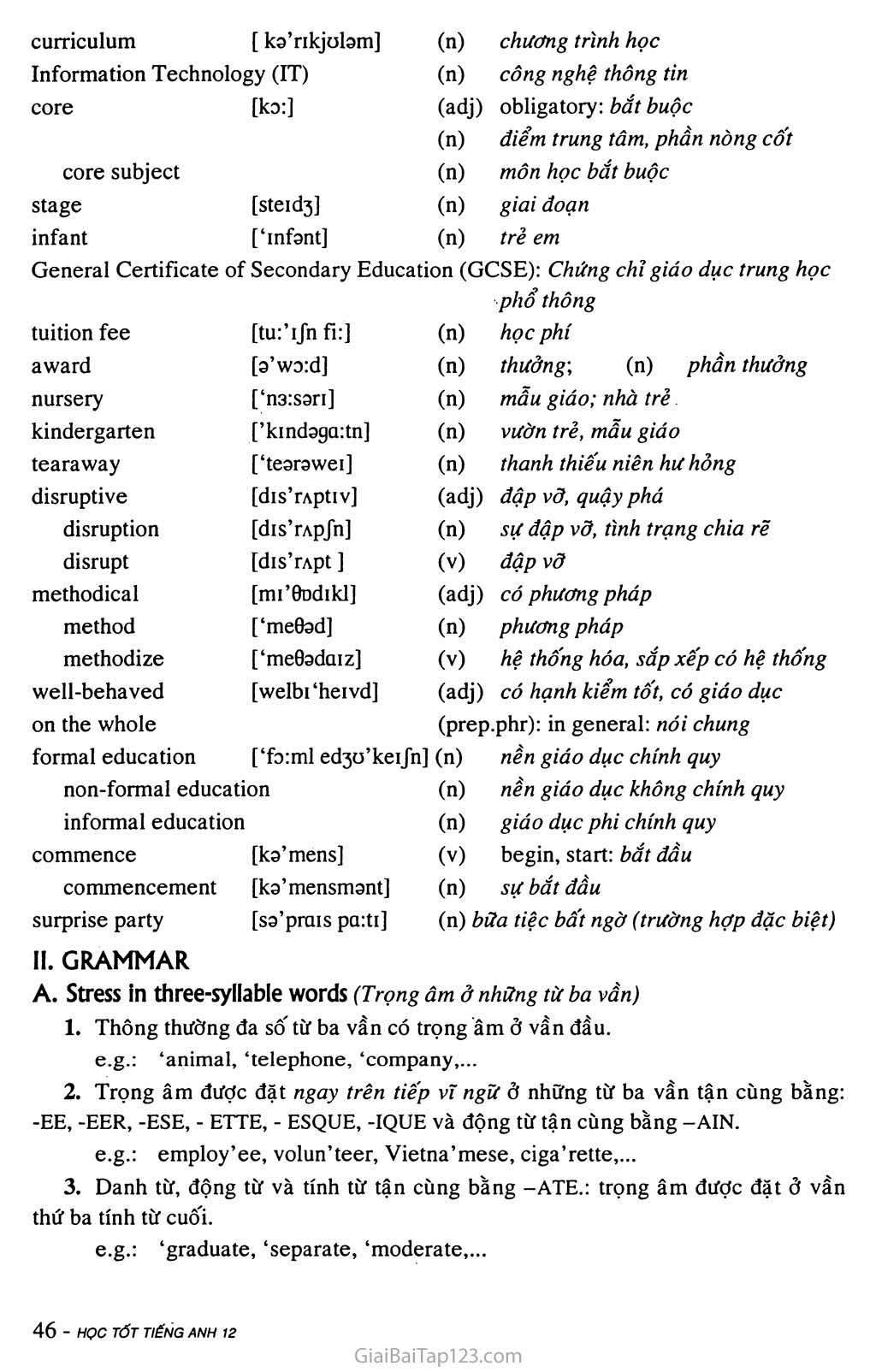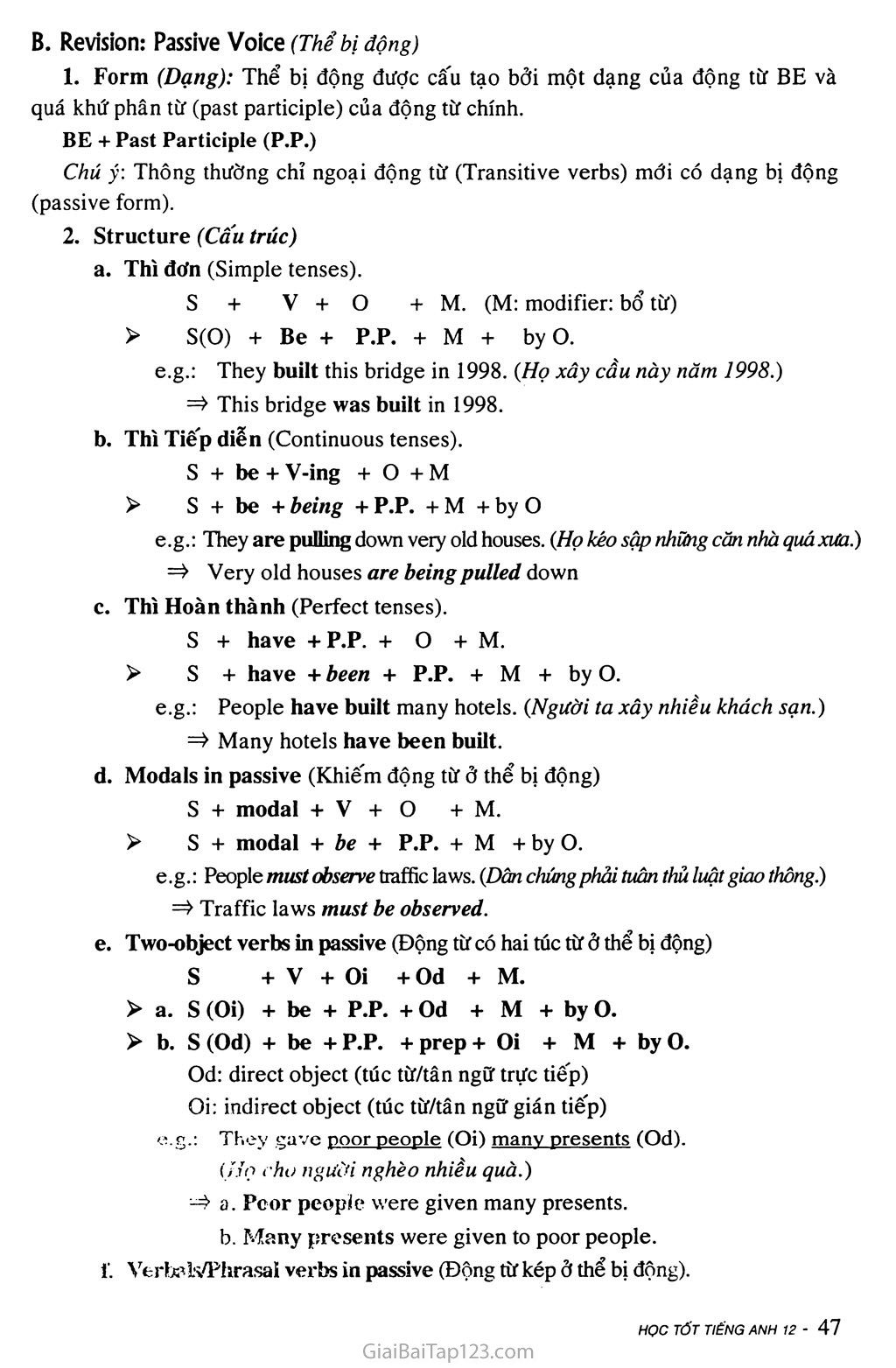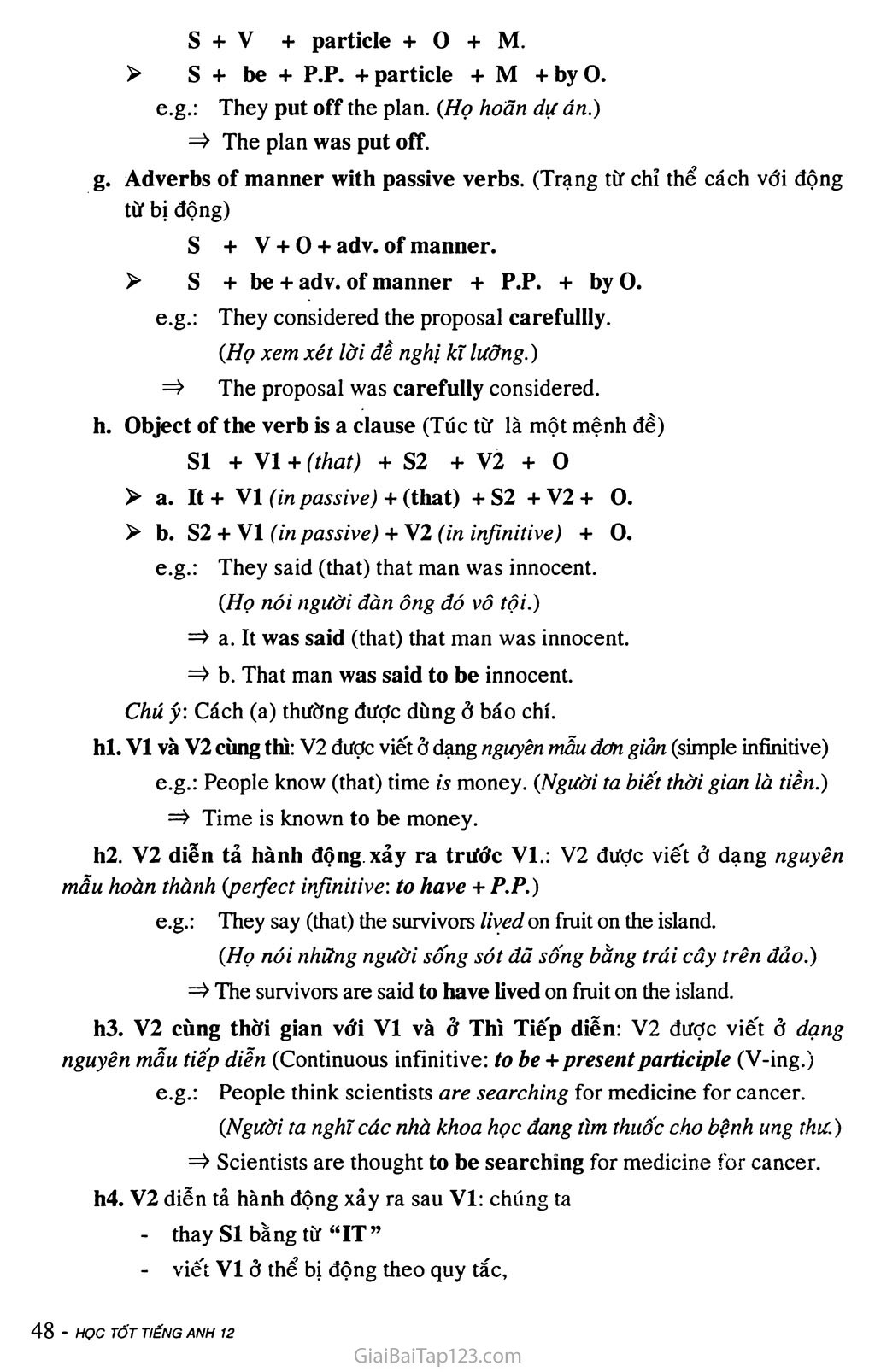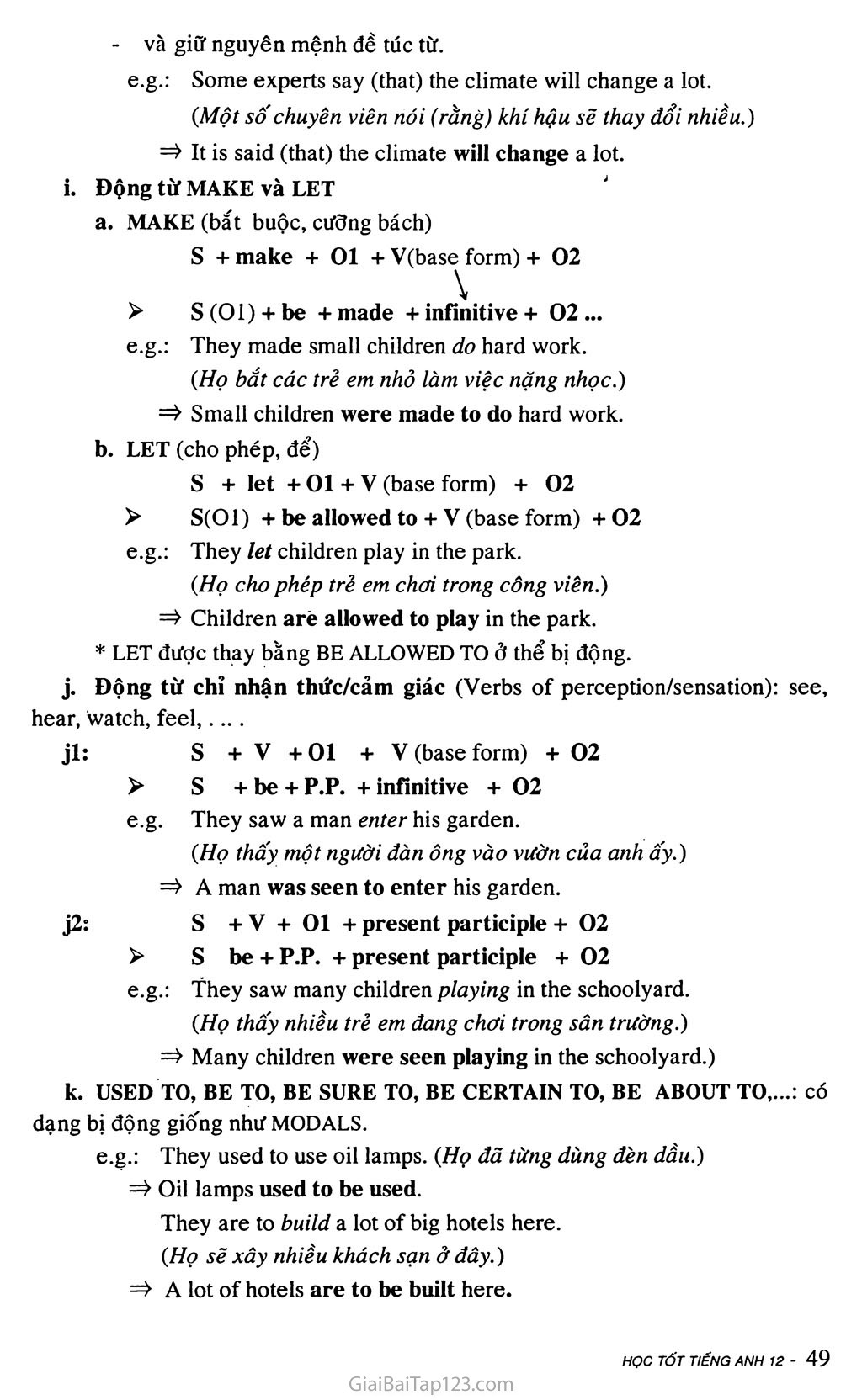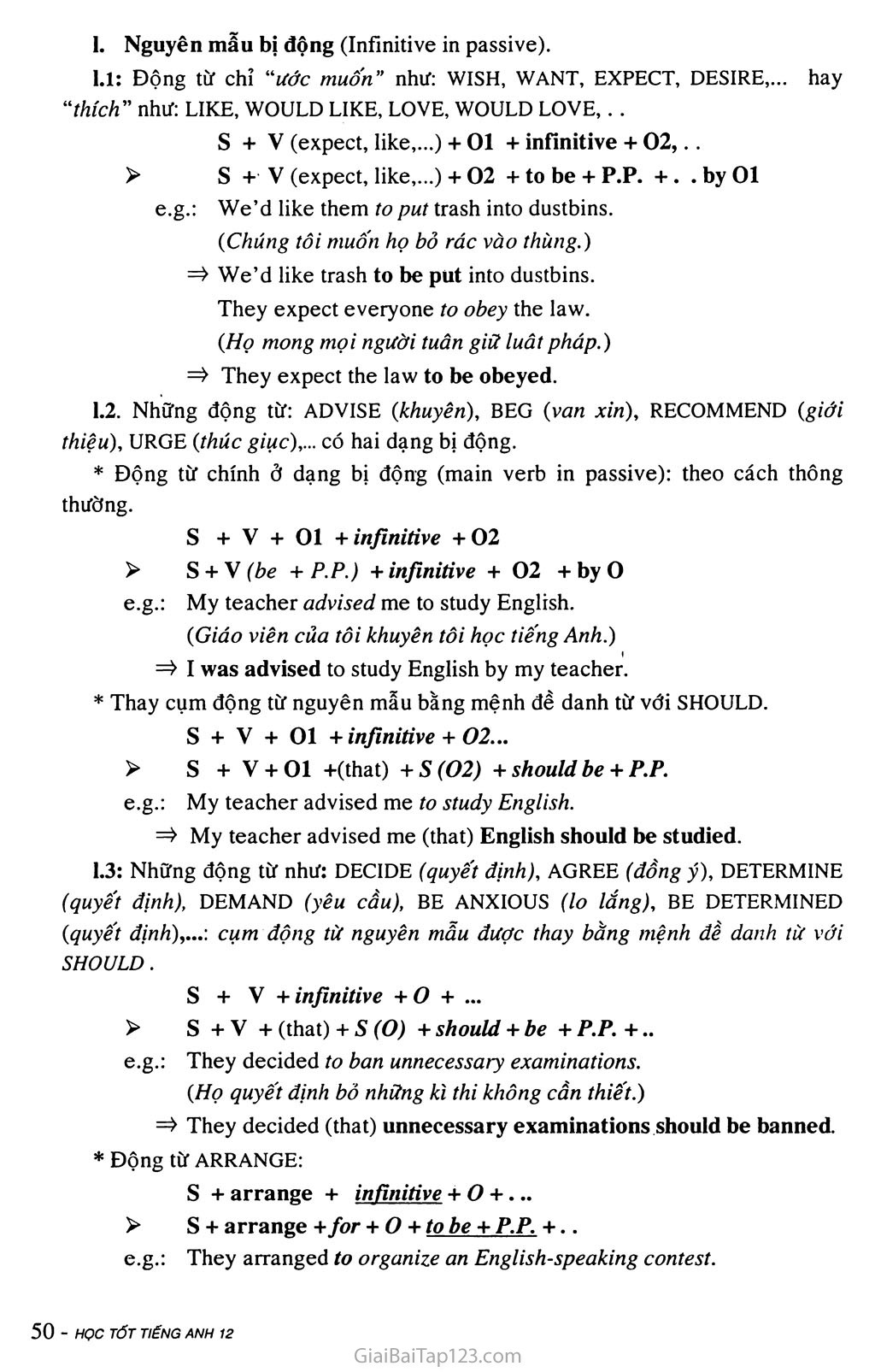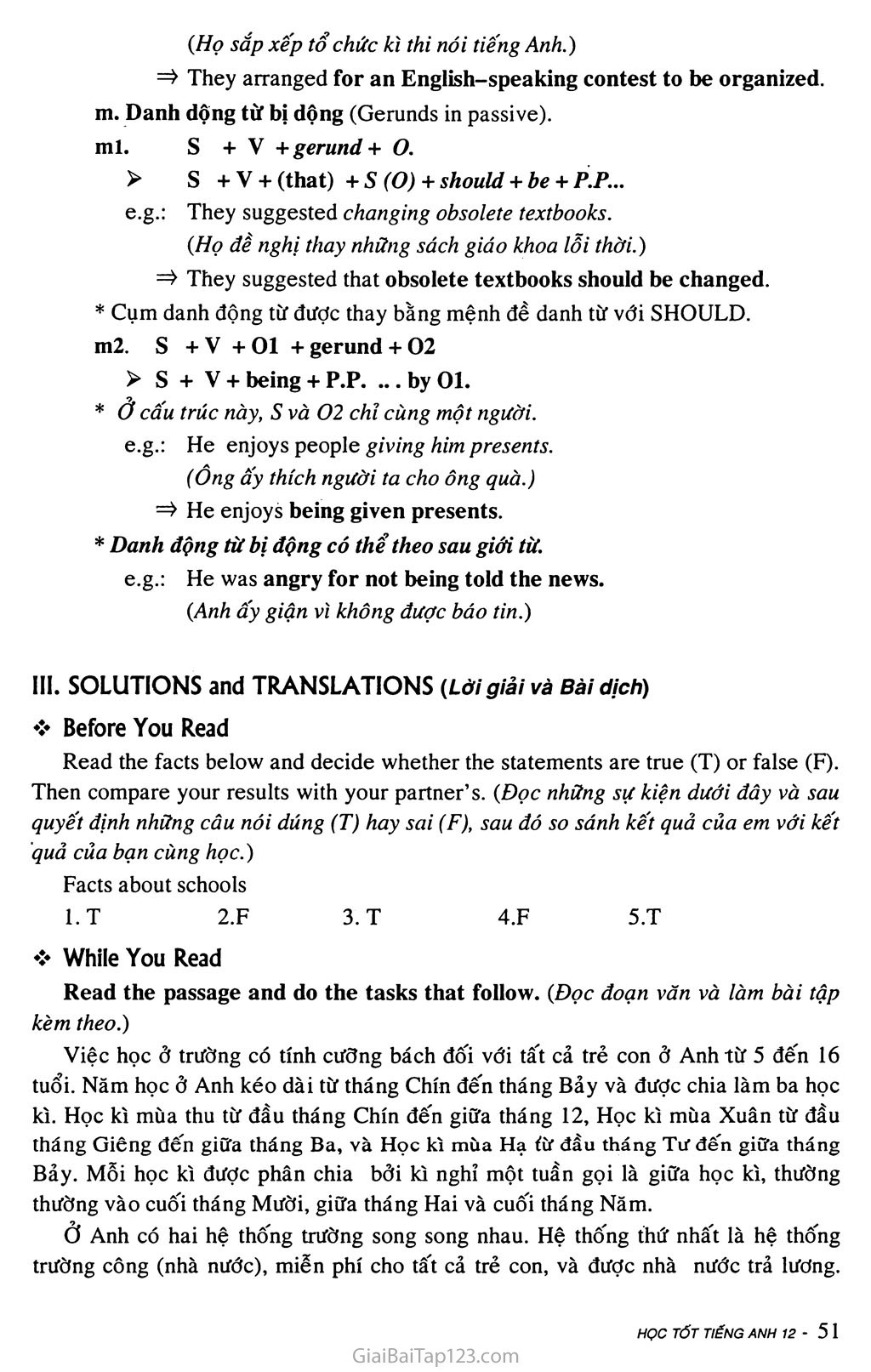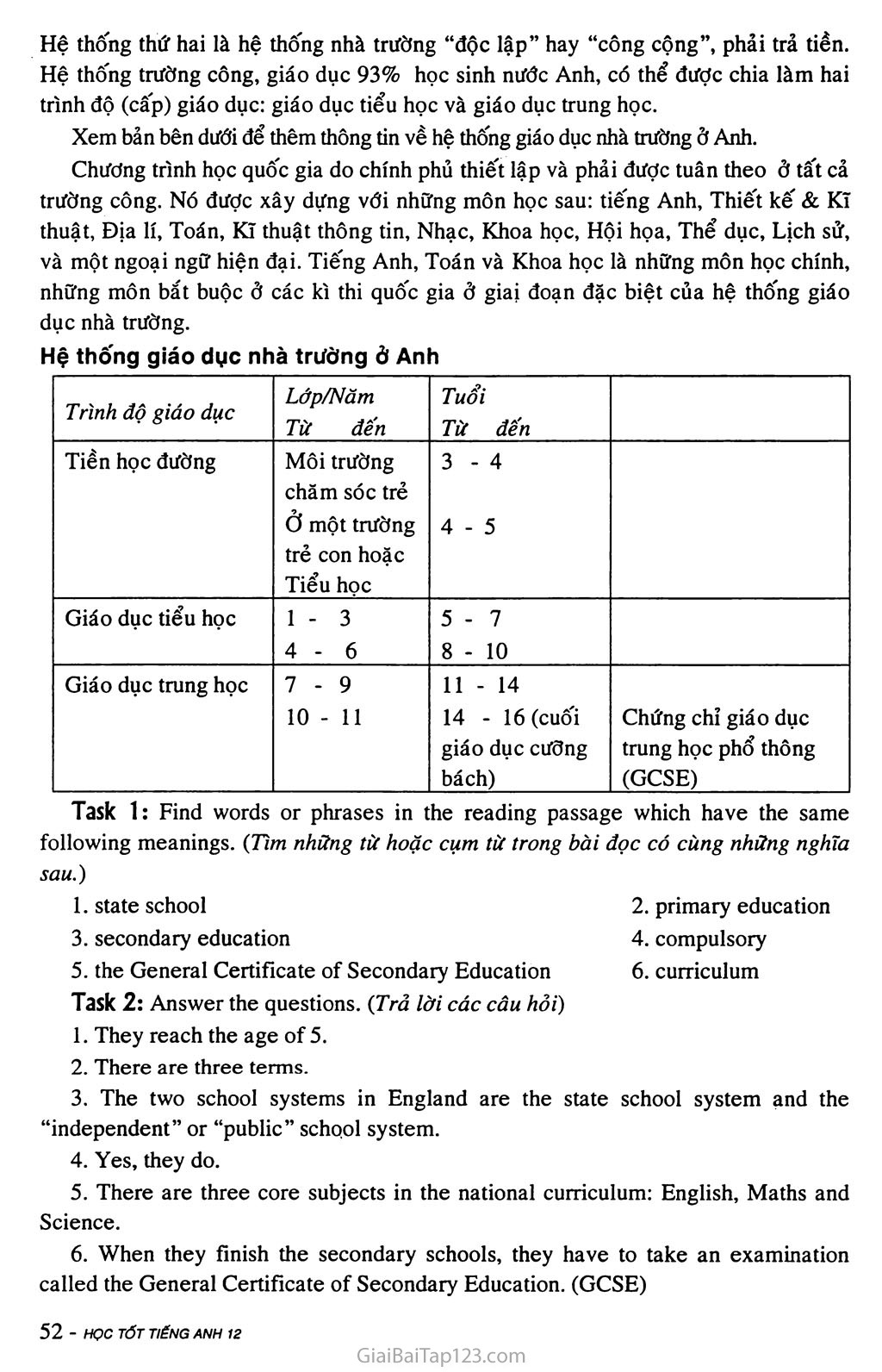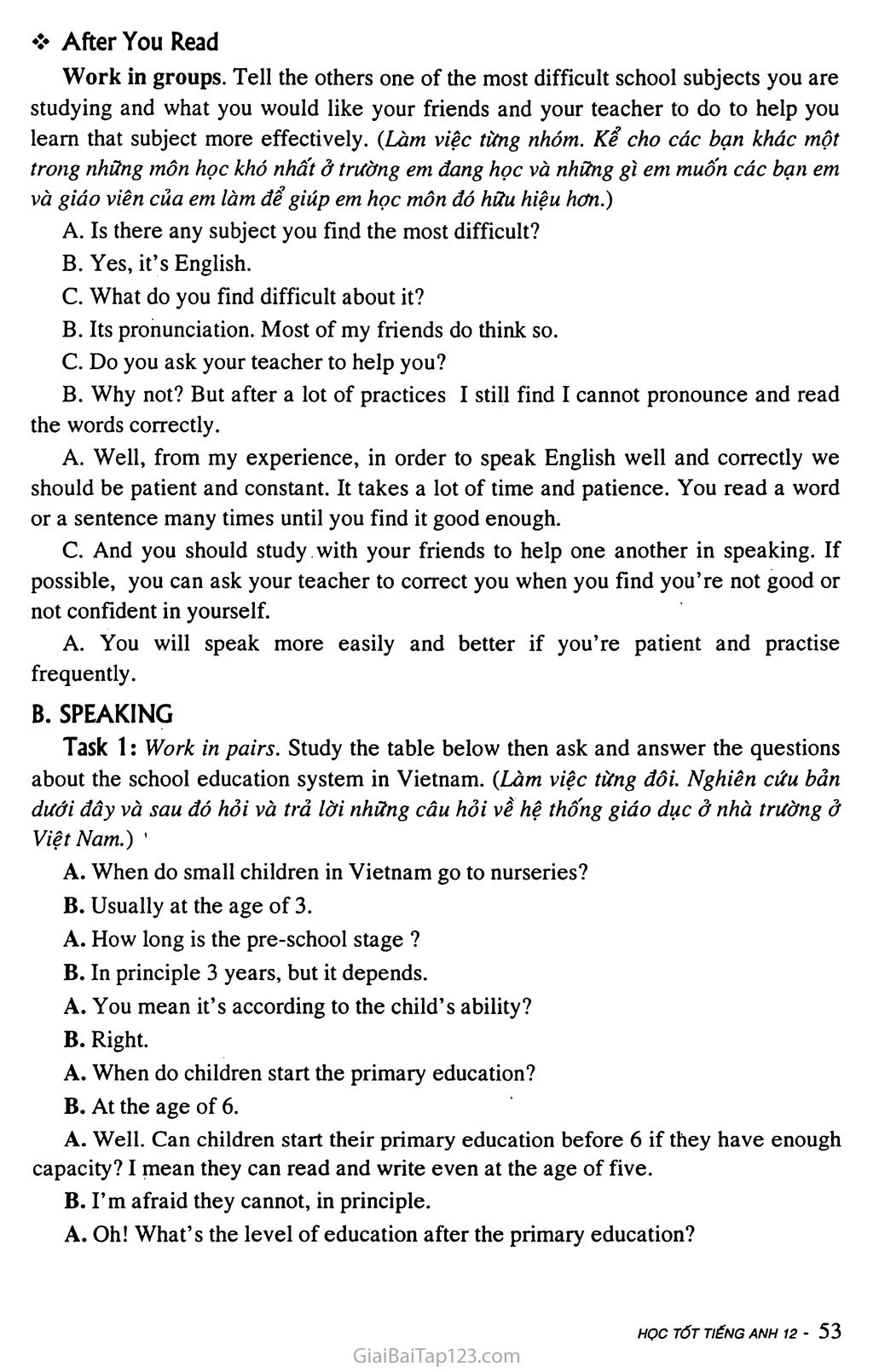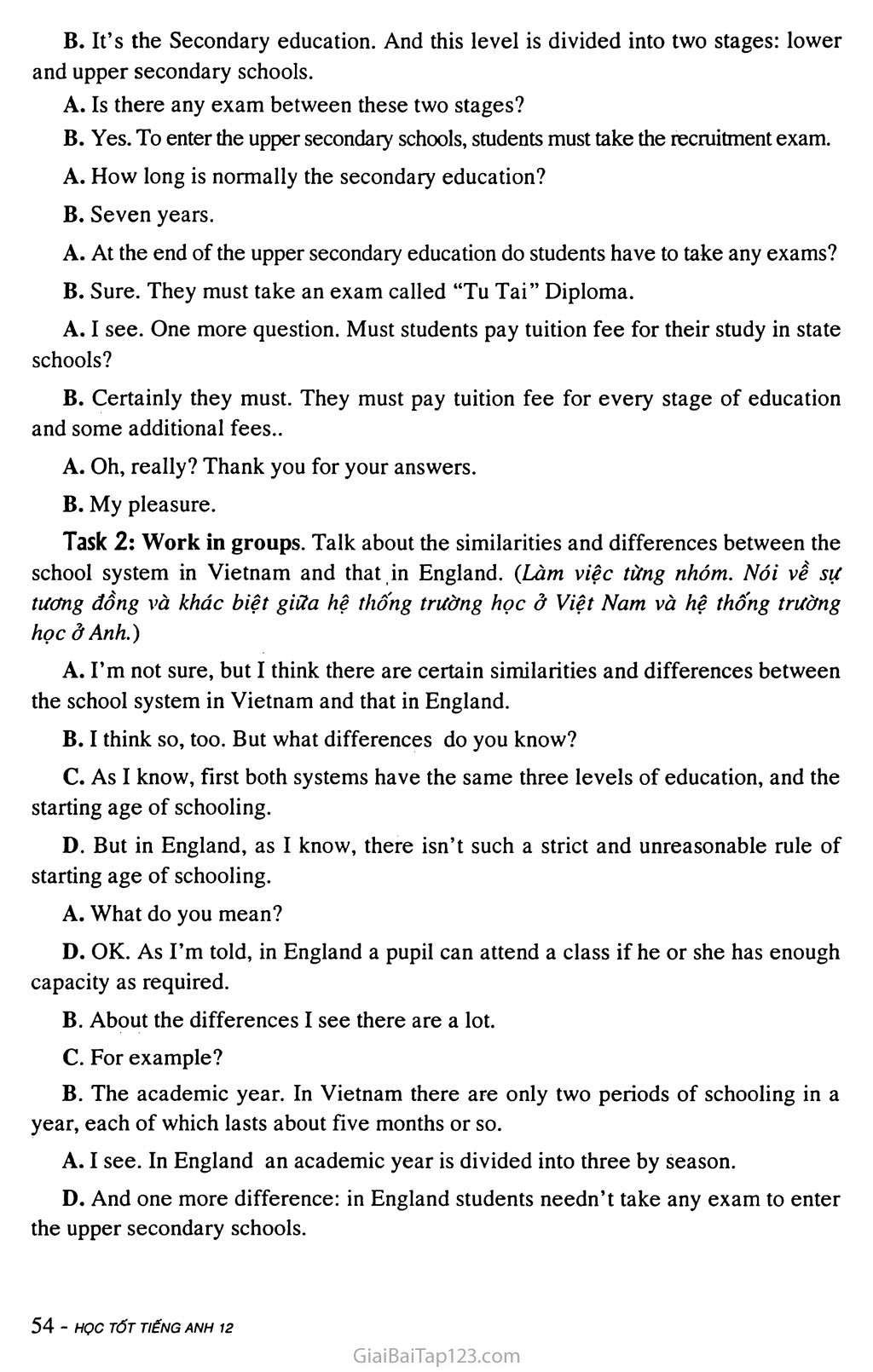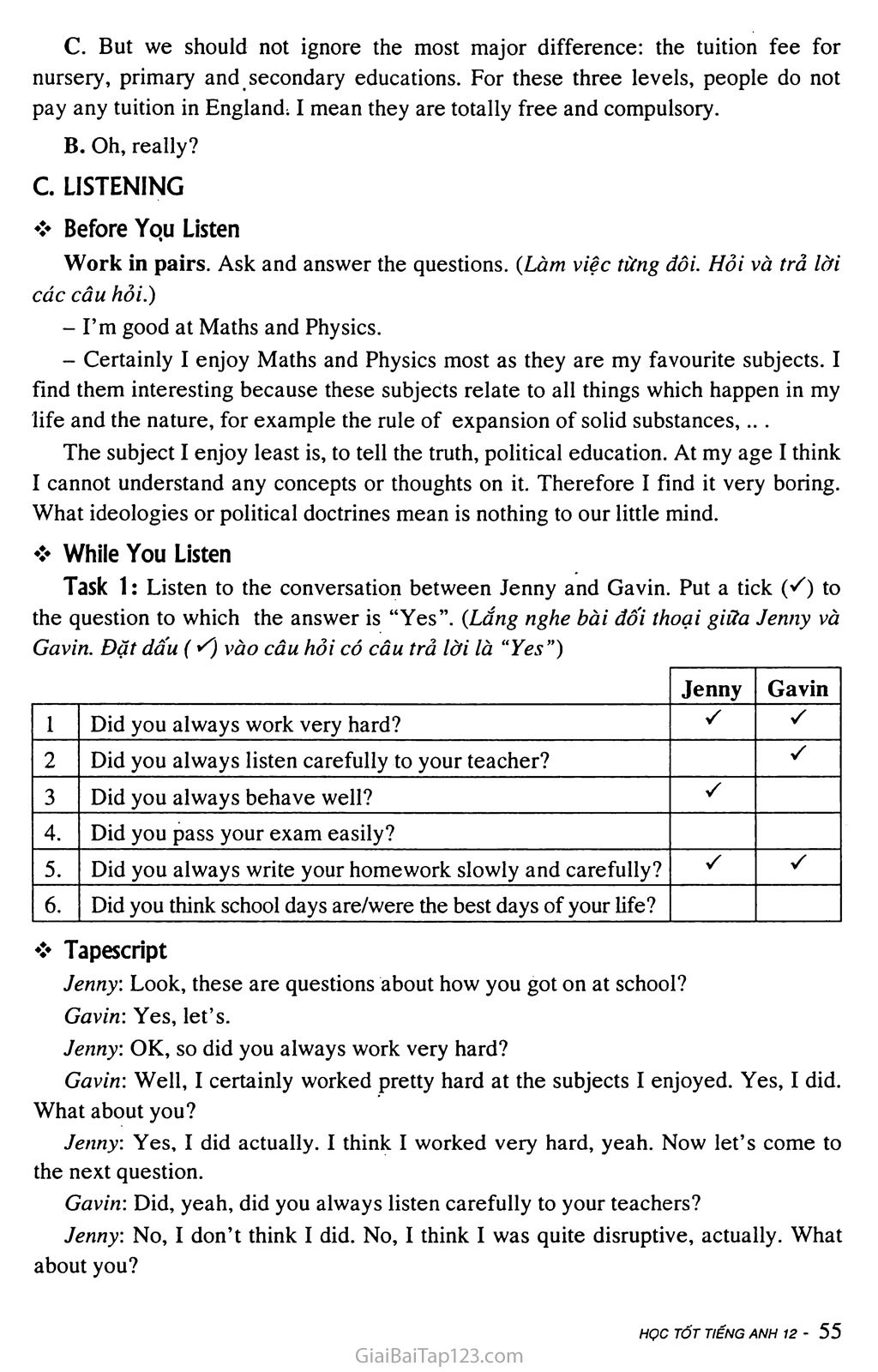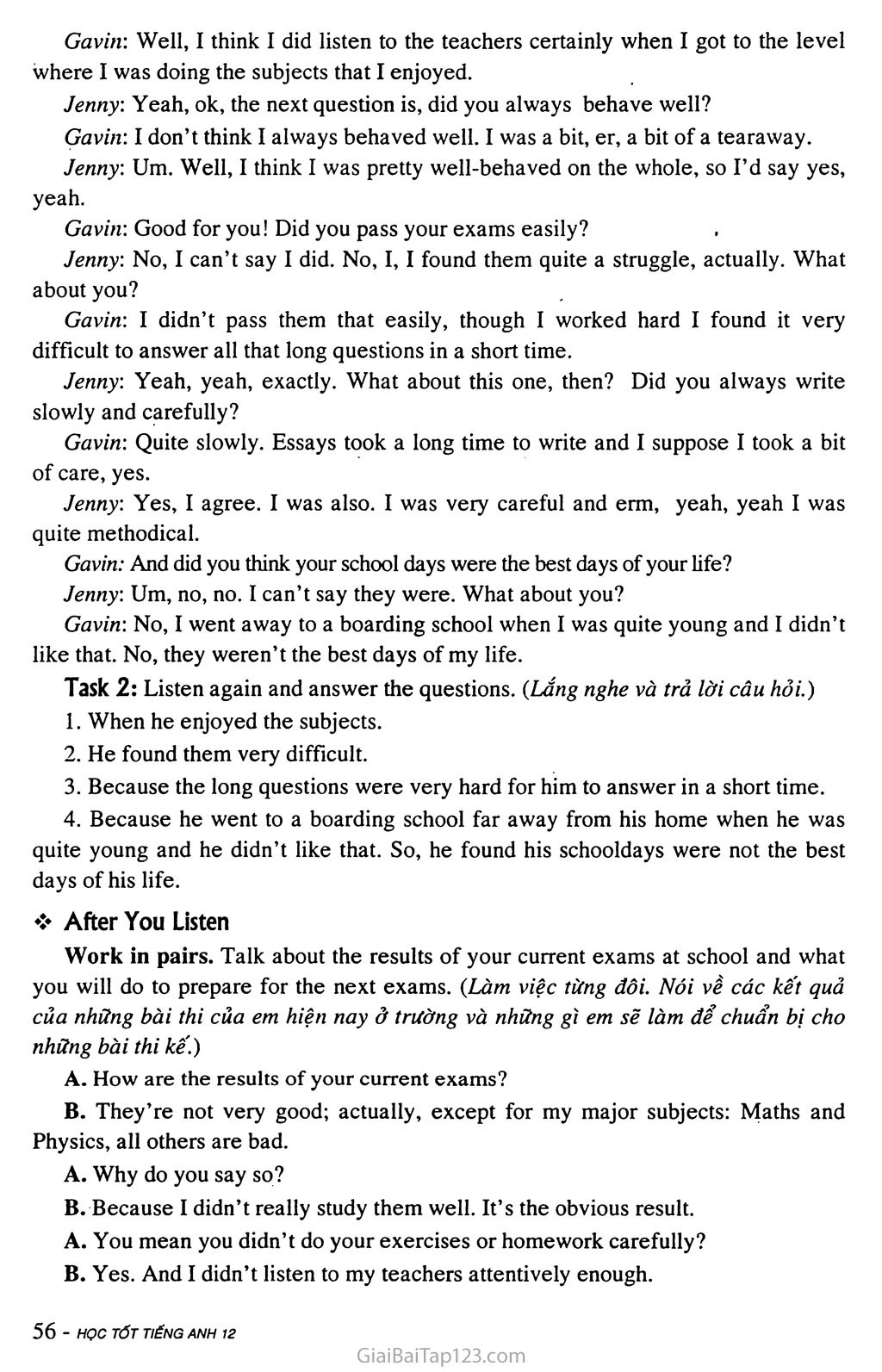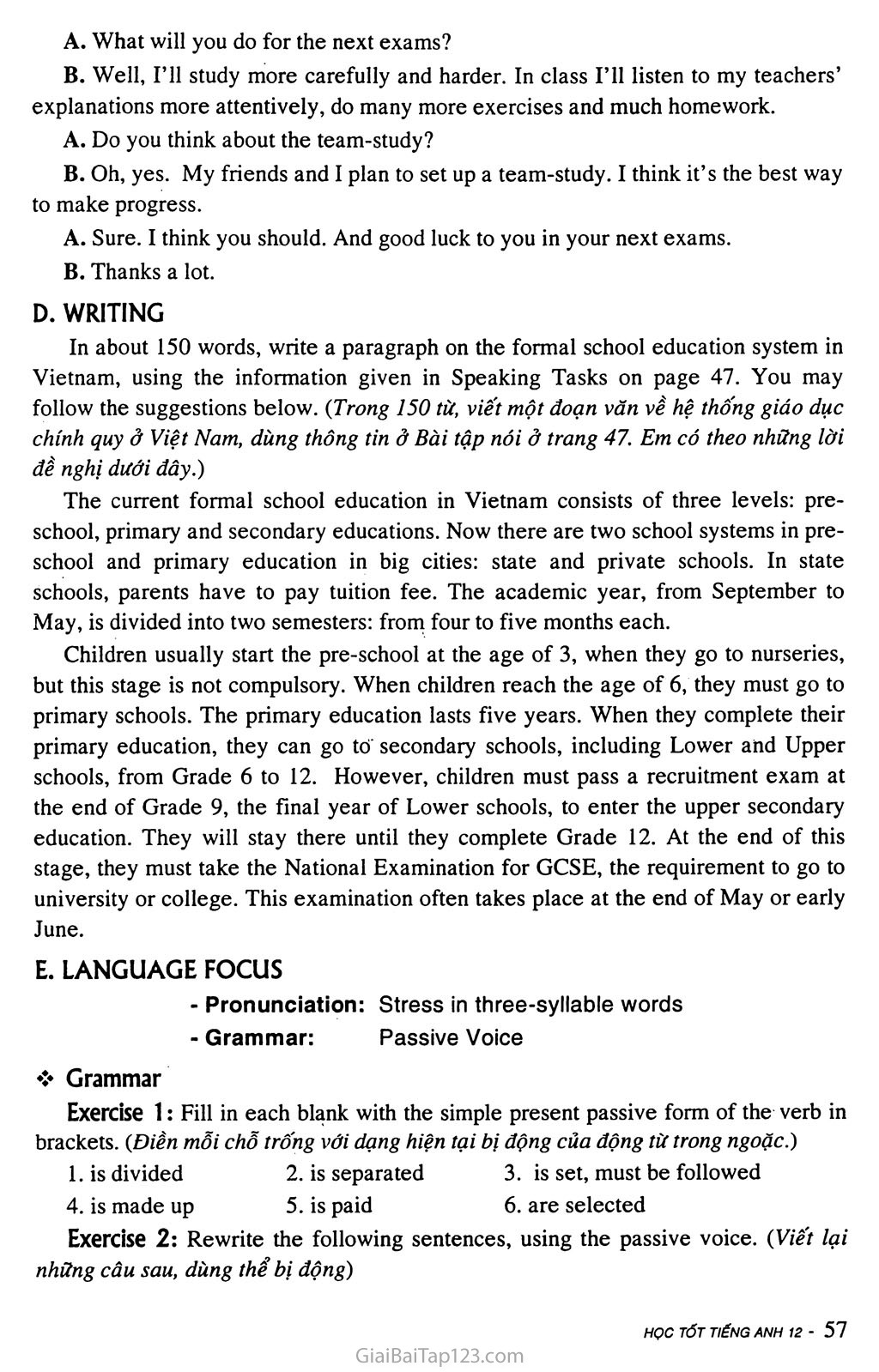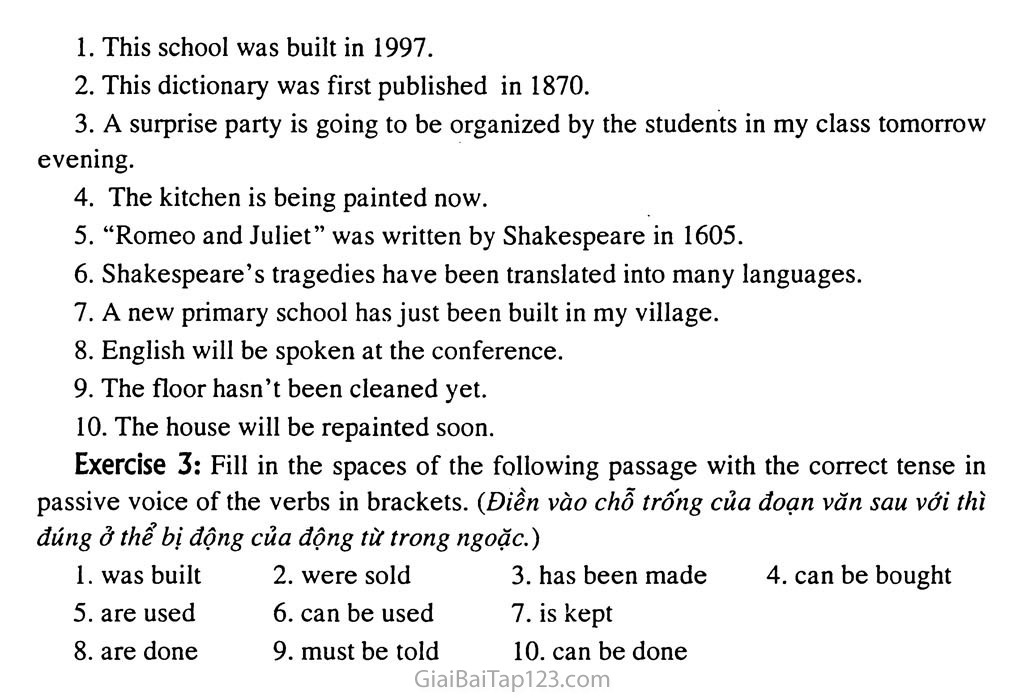Giải tiếng Anh lớp 12 Unit 4: SCHOOL EDUCATION SYSTEM
(MS
41
SCHOOL EDUCATION SYSTEM
(Hệ thống giảo dục nhà trường)
I. VOCABULARY
schooling
school
[‘skudig]
(n)
(V)
việc học/giáo dục ở nhà trường đào tạo, dạy 1 kĩ năng
compulsory
[kom’pAlsari]
(adj)
obligatory: cưỡng bách
compulsion
[kam’pAlJn]
(n)
sự cưỡng bách
compulsive
[kom’pAlsiv]
(adj)
có xu hướng cưỡng bách
compel
[kom’pel]
(V)
oblige, force: cưỡng bách
term
[t3:m]
(n)
học kì, khoảng thời gian ấn định
academic
[ieko’demik]
(adj)
có tính học thuật, thuộc học viện
academy
[o’kaedomi]
(n)
học viện, viện hàn lâm
academic year
(n)
school year: năm học
break
[breik]
(n)
sự nghỉ,'giờ giải lao
parallel
[‘paerolel]
(n)
sự/đường song song
state school
(n)
trường công
private school
(n)
trường tư (thục)
pre-school
[pridskud]
(adj)
(n)
thời kì tiền học đường, trước tuổi ãi học trường dành cho trẻ từ 2-5 tuổi
primary education
[‘prcumari ed3o’keijn]
(n) giáo dục tiểu học
general education
[‘d3enorl ed3o’keijn]
(n) giáo dục phổ thông
secondary education
[‘sekondari ed3o’keijn]
(n) giáo dục trung học
Lower secondary school
(n)
trường trung học cơ sở
Upper secondary school
(n)
trường trung học phổ thông
higher education
(n)
giáo dục đại học
category
[‘kaetsgari]
(n)
loại, hạng, phạm trù
categorize
[‘kaetogaraiz]
(V)
phân loại, chia loại
fee-paying
[Tupeng]
(adj)
trả tiền
curriculum
[ ka’rikjolam]
(n)
chương trình học
Information Technology (IT)
(n)
công nghệ thông tin
core
[ko:]
(adj)
obligatory: bắt buộc
(n)
điểm trung tăm, phần nòng cốt
core subject
(n)
môn học bắt buộc
stage
[steid3]
(n)
giai đoạn
infant
[‘infant]
(n)
trẻ em
General Certificate of Secondary Education (GCSE): Chứng chỉ giáo dục trung học
tuition fee
[tu:Tjh ft:]
(n)
phổ thông học phí
award
[a’wa:d]
(n)
thưởng-, (n) phần thưởng
nursery
[‘n3:sari]
(n)
mẫu giáo; nhà trẻ
kindergarten
[’kindaga:tn]
(n)
vườn trẻ, mẫu giáo
tearaway
[‘tearawei]
(n)
thanh thiếu niên hư hỏng
disruptive
[dis’rAptiv]
(adj)
đập vỡ, quậy phá
disruption
[dis’rApJn]
(n)
sự đập vỡ, tình trạng chia rẽ
disrupt
[dis’rApt ]
(V)
đập vỡ
methodical
[mi’0ndikl]
(adj)
có phương pháp
method
[‘me0ad]
(n)
phương pháp
methodize
[‘meSadaiz]
(V)
hệ thống hóa, sắp xếp có hệ thống
well-behaved
[welbTheivd]
(adj)
có hạnh kiểm tốt, có giáo dục
on the whole
(prep.phr): in general: nói chung
formal education
[‘fa:ml ed3o’keijn] (n)
nền giáo dục chính quy
non-formal education
(n)
nền giáo dục không chính quy
informal education
(n)
giáo dục phi chính quy
commence
[ka’mens]
(V)
begin, start: bắt đầu
commencement
[ka’mensmant]
(n)
sự bắt đầu
surprise party
[sa’prms pa:ti]
(n) bữa tiệc bất ngờ (trường hợp đặc biệt)
II. GRAMMAR
A. Stress in three-syllable words (Trọng âm ở những từ ba vần)
Thông thường đa sô' từ ba vần có trọng âm ở vần đầu. e.g.: ‘animal, ‘telephone, ‘company,...
Trọng âm được đặt ngay trên tiếp vĩ ngữ ỗ những từ ba vần tận cùng bằng: -EE, -EER, -ESE, - ETTE, - ESQUE, -IQUE và động từ tận cùng bằng -AIN.
e.g.: employ’ee, volun’teer, Vietna’mese, ciga’rette,...
Danh từ, động từ và tính từ tận cùng bằng -ATE.: trọng âm được đặt ở vần thứ ba tính từ cuối.
e.g.: ‘graduate, ‘separate, ‘moderate,...
B. Revision: Passive Voice (Thể bị động)
Form (Dạng): Thể bị động được câu tạo bởi một dạng của động từ BE và quá khứ phân từ (past participle) của động từ chính.
BE + Past Participle (P.P.)
Chú ý: Thông thường chỉ ngoại động từ (Transitive verbs) mới có dạng bị động (passive form).
Structure (Cấu trúc)
Thì đơn (Simple tenses).
s + V + o + M. (M: modifier: bổ từ)
S(O) + Be + P.P. + M + byO.
e.g.: They built this bridge in 1998. (Họ xây cầu này năm 1998.)
=> This bridge was built in 1998.
Thì Tiếp diễn (Continuous tenses).
s + be + V-ing + o + M
s + be + being + P.P. + M + by o
e.g.: They are pulling down very old houses. (Họ kéo sập những căn nhà quá xưa.) => Very old houses are being pulled down
Thì Hoàn thành (Perfect tenses).
s + have + P.P. + o + M.
s + have + been + p.p. + M + by o.
e.g.: People have built many hotels. (Người ta xây nhiều khách sạn.)
=> Many hotels have been built.
Modals in passive (Khiếm động từ ở thể bị động)
s + modal + V + o + M.
s + modal + be + p.p. + M + by o.
e.g.: People must observe traffic laws. (Dân chúng phải tuân thủ luật giao thông.)
=> Traffic laws must be observed.
Two-object verbs in passive (Động từ có hai túc từ ở thể bị động)
s + V + Oi +Od + M.
a. s (Oi) + be + p.p. + Od + M + by o.
b. s (Od) + be + p.p. + prep + Oi + M + by 0.
Od: direct object (túc từ/tân ngữ trực tiếp)
Oi: indirect object (túc từ/tân ngữ gián tiếp)
e.g.: They gave poor people (Oi) many presents (Od).
(Họ cho người nghèo nhiều quà.)
Poor people were given many presents.
Many presents were given to poor people.
Verbals/Phrasal verbs in passive (Động từ kép ở thể bị động).
s + V + particle + 0 + M.
s + be + p.p. + particle + M + by o.
e.g.: They put off the plan. (Họ hoãn dự án.}
=> The plan was put off.
Adverbs of manner with passive verbs. (Trạng từ chỉ thể cách với động từ bị động)
s + V + 0 + adv. of manner.
s + be + adv. of manner + p.p. + by o. e.g.: They considered the proposal carefullly.
(Họ xem xét lời đề nghị kĩ lưỡng.)
=> The proposal was carefully considered.
Object of the verb is a clause (Túc từ là một mệnh đề)
SI + VI + (that) + S2 + V2 + o
a. It + VI (in passive) + (that) + S2 + V2 + o.
b. S2 + V1 (in passive) + V2 (in infinitive) + 0. e.g.: They said (that) that man was innocent.
(Họ nói người đàn ông đó vô tội.)
=> a. It was said (that) that man was innocent.
=> b. That man was said to be innocent.
Chú ý-. Cách (a) thường được dùng ở báo chí. hl. VI và V2 cùng thì: V2 được viết ố dạng nguyên mẫu đơn giản (simple infinitive)
e.g.: People know (that) time is money. (Người ta biết thời gian là tiền.) => Time is known to be money.
h2. V2 diễn tả hành động, xảy ra trước VI.: V2 được viết ở dạng nguyên mẫu hoàn thành (perfect infinitive-, to have + p.p.)
e.g.: They say (that) the survivors lived on fruit on the island.
(Họ nói những người sống sót đã sống bằng trái cây trên đảo.)
=> The survivors are said to have lived on fruit on the island.
h3. V2 cùng thời gian với VI và ở Thì Tiếp diễn: V2 được viết ở dạng nguyên mẫu tiếp diễn (Continuous infinitive: to be + present participle (V-ing.)
e.g.: People think scientists are searching for medicine for cancer.
(Người ta nghĩ các nhà khoa học đang tìm thuốc cho bệnh ung thư.) => Scientists are thought to be searching for medicine for cancer.
h4. V2 diễn tả hành động xảy ra sau VI: chúng ta
thay SI bằng từ “IT”
viết VI ở thể bị động theo quy tắc,
- và giữ nguyên mệnh đề túc từ. e.g.: Some experts say (that) the climate will change a lot.
{Một số chuyên viên nói (rằng) khí hậu sẽ thay đổi nhiều.)
=> It is said (that) the climate will change a lot.
Động từ MAKE và LET
MAKE (bắt buộc, cưỡng bách)
s + make + 01 + V(base form) + 02
S(01) + be +made + infinitive + 02... e.g.: They made small children do hard work.
(Họ bắt các trẻ em nhỏ làm việc nặng nhọc.)
=4 Small children were made to do hard work.
LET (cho phép, để)
s + let + 01 + V (base form) + 02
S(O1) + be allowed to + V (base form) +02 e.g.: They let children play in the park.
(Họ cho phép trẻ em chơi trong công viên.)
=> Children are allowed to play in the park.
* LET được thay bằng BE ALLOWED TO ở thể bị động.
Động từ chỉ nhận thức/cảm giác (Verbs of perception/sensation): see, hear, watch, feel,... .
jl: s + V + 01 + V (base form) + 02
s + be + p.p. + infinitive + 02 e.g. They saw a man enter his garden.
(Họ thấy một người đàn ông vào vườn của anh ấy.)
=> A man was seen to enter his garden.
j2: s + V + 01 + present participle + 02
s be + p.p. + present participle + 02
e.g.: They saw many children playing in the schoolyard.
(Họ thấy nhiều trẻ em đang chơi trong sân trường.)
=> Many children were seen playing in the schoolyard.)
USED TO, BE TO, BE SURE TO, BE CERTAIN TO, BE ABOUT TO,...: CÓ dạng bị động giống như MODALS.
e.g.: They used to use oil lamps. (Họ đã từng dùng đèn dầu.)
=> Oil lamps used to be used.
They are to build a lot of big hotels here.
(Họ sẽ xây nhiều khách sạn ở đây.)
=> A lot of hotels are to be built here.
1. Nguyên mẫu bị động (Infinitive in passive).
1.1: Động từ chỉ “ước muốn” như: WISH, WANT, EXPECT, DESIRE,... hay “thích" như: LIKE, WOULD LIKE, LOVE, WOULD LOVE,..
s + V (expect, like,...) + 01 + infinitive + 02,..
s + V (expect, like,...) + 02 + to be + p.p. + . . by 01 e.g.: We’d like them to put trash into dustbins.
(Chúng tôi muốn họ bỏ rác vào thùng.)
=> We’d like trash to be put into dustbins.
They expect everyone to obey the law.
(Họ mong mọi người tuân giữ luât pháp.)
=> They expect the law to be obeyed.
1.2. Những động từ: ADVISE (khuyên), BEG (van xin), RECOMMEND (gidi thiệu), URGE (thúc giục),... có hai dạng bị động.
Động từ chính ở dạng bị động (main verb in passive): theo cách thông thường.
s + V + 01 + infinitive + 02
S + N (be + p.p.) + infinitive + 02 + by o e.g.: My teacher advised me to study English.
(Giáo viên của tôi khuyên tôi học tiếng Anh.)
=> I was advised to study English by my teacher.
Thay cụm động từ nguyên mẫu bằng mệnh đề danh từ với SHOULD.
s + V + 01 + infinitive + 02...
s + V + 01 +(thăt) + s (02) + should be + p.p. e.g.: My teacher advised me to study English.
=> My teacher advised me (that) English should be studied.
1.3: Những động từ như: DECIDE (quyết định), AGREE (đồng ý), DETERMINE
(quyết định), DEMAND (yể« cầu), BE ANXIOUS (lo lắng), BE DETERMINED (quyết định),...: cụm động từ nguyên mẫu được thay bằng mệnh đề danh từ với SHOULD.
s + V + infinitive + o + ...
s + v +(that) + S(ớ) + should + be + p.p. +.. e.g.: They decided to ban unnecessary examinations.
(Họ quyết định bỗ những kì thi không cẩn thiết.)
=> They decided (that) unnecessary examinations should be banned.
Động từ ARRANGE:
s + arrange + infinitive + o + ...
s + arrange + for + o + to be + p.p. +..
e.g.: They arranged to organize an English-speaking contest.
(Họ sắp xếp tổ chức kì thỉ nói tiếng Anh.)
=> They arranged for an English-speaking contest to be organized.
m. Danh dộng từ bị dộng (Gerunds in passive), ml. s + V + gerund + o.
s + V + (that) + s (O) + should + be + p.p... e.g.: They suggested changing obsolete textbooks.
(Họ đề nghị thay những sách giáo khoa lỗi thời.)
=> They suggested that obsolete textbooks should be changed.
Cụm danh động từ được thay bằng mệnh đề danh từ với SHOULD. m2, s + V + 01 + gerund + 02
s + V + being + p.p. ... by 01.
Ớ cấu trúc này, s và 02 chỉ cùng một người. e.g.: He enjoys people giving him presents.
(Ong ấy thích người ta cho ông quà.)
=> He enjoys being given presents.
Danh động từ bị động có thể theo sau giới từ.
g.: He was angry for not being told the news.
(Anh ấy giận vì không được báo tin.)
IU. SOLUTIONS and TRANSLATIONS (Lời giải và Bài dịch)
Before You Read
Read the facts below and decide whether the statements are true (T) or false (F). Then compare your results with your partner’s. (Đọc những sự kiện dưới đây và sau quyết định những câu nói dúng (T) hay sai (F), sau đó so sánh kết quả của em với kết quả của bạn cùng học.)
Facts about schools
T 2.F 3.T 4.F 5.T
While You Read
Read the passage and do the tasks that follow. (Đọc đoạn văn và làm bài tập kèm theo.)
Việc học ở trường có tính cưỡng bách đôi với tất cả trẻ con ở Anh từ 5 đến 16 tuổi. Năm học ở Anh kéo dài từ tháng Chín đến tháng Bảy và được chia làm ba học kì. Học kì mùa thu từ đầu tháng Chín đến giữa tháng 12, Học kì mùa Xuân từ đầu tháng Giêng đến giữa tháng Ba, và Học kì mùa Hạ íừ đầu tháng Tư đến giữa tháng Bảy. Mỗi học kì được phân chia bởi kì nghỉ một tuần gọi là giữa học kì, thường thường vào cuối tháng Mười, giữa tháng Hai và cuối tháng Năm.
Ở Anh có hai hệ thông trường song song nhau. Hệ thông thứ nhâì là hệ thông trường công (nhà nước), miễn phí cho tất cả trẻ con, và được nhà nước trả lương.
Hệ thông thứ hai là hệ thống nhà trường “độc lập” hay “công cộng”, phải trả tiền. Hệ thống trường công, giáo dục 93% học sinh nước Anh, có thể được chia làm hai trình độ (cấp) giáo dục: giáo dục tiểu học và giáo dục trung học.
Xem bản bên dưới để thêm thông tin về hệ thống giáo dục nhà trường ở Anh.
Chương trình học quốc gia do chính phủ thiết lập và phải được tuân theo ở tất cả
trường công. Nó được xây dựng với những môn học sau: tiếng Anh, Thiết kế & Kĩ thuật, Địa lí, Toán, Kĩ thuật thông tin, Nhạc, Khoa học, Hội họa, Thể dục, Lịch sử, và một ngoại ngữ hiện đại. Tiếng Anh, Toán và Khoa học là những môn học chính, những môn bắt buộc ở các kì thi quốc gia ở giai đoạn đặc biệt của hệ thông giáo dục nhà trường.
Hệ thống giáo dục nhà trường ở Anh
Trình độ giáo dục
Lớp/Năm
Từ đến
Tuổi
Từ đến
Tiền học đường
Môi trường chăm sóc trẻ ơ một trường trẻ con hoặc Tiểu học
- 4
- 5
Giáo dục tiểu học
1 - 3
4 - 6
5 - 7
8 - 10
Giáo dục trung học
7 - 9
10 - 11
11 - 14
14 - 16 (cuối giáo dục cưỡng bách)
Chứng chỉ giáo dục trung học phổ thông (GCSE)
Task 1: Find words or phrases in the reading passage which have the same following meanings. (Tìm những từ hoặc cụm từ trong bài đọc có cùng những nghĩa sau.)
state school 2. primary education
3. secondary education 4. compulsory
5. the General Certificate of Secondary Education 6. curriculum
Task 2: Answer the questions. (Trả lời các câu hỏi)
They reach the age of 5.
There are three terms.
The two school systems in England are the state school system and the “independent” or “public” school system.
Yes, they do.
There are three core subjects in the national curriculum: English, Maths and Science.
When they finish the secondary schools, they have to take an examination called the General Certificate of Secondary Education. (GCSE)
❖ After You Read
Work in groups. Tell the others one of the most difficult school subjects you are studying and what you would like your friends and your teacher to do to help you learn that subject more effectively. {Làm việc từng nhóm. Kể cho các bạn khác một trong những môn học khó nhất ở trường em đang học và những gì em muốn các bạn em và giáo viên của em làm để giúp em học môn đó hữu hiệu hơn.)
Is there any subject you find the most difficult?
Yes, it’s English.
What do you find difficult about it?
B. Its pronunciation. Most of my friends do think so. c. Do you ask your teacher to help you?
B. Why not? But after a lot of practices I still find I cannot pronounce and read the words correctly.
A. Well, from my experience, in order to speak English well and correctly we should be patient and constant. It takes a lot of time and patience. You read a word or a sentence many times until you find it good enough.
c. And you should study with your friends to help one another in speaking. If possible, you can ask your teacher to correct you when you find you’re not good or not confident in yourself.
A. You will speak more easily and better if you’re patient and practise frequently.
B. SPEAKING
Task 1: Work in pairs. Study the table below then ask and answer the questions about the school education system in Vietnam. {Làm việc từng đôi. Nghiên cứu bản dưới đây và sau đó hỏi và trả lời những câu hỏi về hệ thống giáo dục ở nhà trường ở Việt Nam.) ’
When do small children in Vietnam go to nurseries?
Usually at the age of 3.
How long is the pre-school stage ?
In principle 3 years, but it depends.
You mean it’s according to the child’s ability?
Right.
When do children start the primary education?
At the age of 6.
Well. Can children start their primary education before 6 if they have enough capacity? I mean they can read and write even at the age of five.
I’m afraid they cannot, in principle.
A. Oh! What’s the level of education after the primary education?
B. It’s the Secondary education. And this level is divided into two stages: lower and upper secondary schools.
Is there any exam between these two stages?
Yes. To enter the upper secondary' schools, students must take the recruitment exam.
How long is normally the secondary education?
Seven years.
At the end of the upper secondary education do students have to take any exams?
Sure. They must take an exam called “Tu Tai” Diploma.
I see. One more question. Must students pay tuition fee for their study in state schools?
Certainly they must. They must pay tuition fee for every stage of education and some additional fees..
Oh, really? Thank you for your answers.
My pleasure.
Task 2: Work in groups. Talk about the similarities and differences between the school system in Vietnam and that in England. {Làm việc từng nhóm. Nói về sự tương đồng và khác biệt giữa hệ thống trường học ở Việt Nam và hệ thống trường học ở Anh.)
I’m not sure, but I think there are certain similarities and differences between the school system in Vietnam and that in England.
I think so, too. But what differences do you know?
c. As I know, first both systems have the same three levels of education, and the starting age of schooling.
D. But in England, as I know, there isn’t such a strict and unreasonable rule of starting age of schooling.
What do you mean?
D. OK. As I’m told, in England a pupil can attend a class if he or she has enough capacity as required.
About the differences I see there are a lot. c. For example?
B. The academic year. In Vietnam there are only two periods of schooling in a year, each of which lasts about five months or so.
A. I see. In England an academic year is divided into three by season.
D. And one more difference: in England students needn’t take any exam to enter the upper secondary schools.
c. But we should not ignore the most major difference: the tuition fee for nursery, primary and secondary educations. For these three levels, people do not pay any tuition in England; I mean they are totally free and compulsory.
B. Oh, really?
c. LISTENING
Before Yqu Listen
Work in pairs. Ask and answer the questions. (Làm việc từng đôi. Hỏi và trả lời các câu hỏi.)
I’m good at Maths and Physics.
Certainly I enjoy Maths and Physics most as they are my favourite subjects. I find them interesting because these subjects relate to all things which happen in my life and the nature, for example the rule of expansion of solid substances,.. .
The subject I enjoy least is, to tell the truth, political education. At my age I think I cannot understand any concepts or thoughts on it. Therefore I find it very boring. What ideologies or political doctrines mean is nothing to our little mind.
While You Listen
Task 1: Listen to the conversation between Jenny and Gavin. Put a tick (*9 to the question to which the answer is “Yes”. (Lắng nghe bài đối thoại giữa Jenny và Gavin. Đặt dấu (S) vào câu hỏi có câu trả lời là “Yes”)
Jenny
Gavin
1
Did you always work very hard?
z
z
2
Did you always listen carefully to your teacher?
z
3
Did you always behave well?
z
4.
Did you pass your exam easily?
5.
Did you always write your homework slowly and carefully?
z
z
6.
Did you think school days are/were the best days of your life?
❖ Tapescript
Jenny. Look, these are questions about how you got on at school?
Gavin-. Yes, let’s.
Jenny-. OK, so did you always work very hard?
Gavin-. Well, I certainly worked pretty hard at the subjects I enjoyed. Yes, I did. What about you?
Jenny-. Yes, I did actually. I think I worked very hard, yeah. Now let’s come to the next question.
Gavin-. Did, yeah, did you always listen carefully to your teachers?
Jenny-. No, I don’t think I did. No, I think I was quite disruptive, actually. What
about you?
Gavin: Well, I think I did listen to the teachers certainly when I got to the level where I was doing the subjects that I enjoyed.
Jenny: Yeah, ok, the next question is, did you always behave well?
Gavin: I don’t think I always behaved well. I was a bit, er, a bit of a tearaway.
Jenny: Um. Well, I think I was pretty well-behaved on the whole, so I’d say yes, yeah.
Gavin: Good for you! Did you pass your exams easily?
Jenny: No, I can’t say I did. No, I, I found them quite a struggle, actually. What about you?
Gavin: I didn’t pass them that easily, though I worked hard I found it very difficult to answer all that long questions in a short time.
Jenny: Yeah, yeah, exactly. What about this one, then? Did you always write slowly and carefully?
Gavin: Quite slowly. Essays took a long time to write and I suppose I took a bit of care, yes.
Jenny: Yes, I agree. I was also. I was very careful and erm, yeah, yeah I was quite methodical.
Gavin: And did you think your school days were the best days of your life?
Jenny: Um, no, no. I can’t say they were. What about you?
Gavin: No, I went away to a boarding school when I was quite young and I didn’t like that. No, they weren’t the best days of my life.
Task 2: Listen again and answer the questions. (Lắng nghe và trả lời câu hỏi.)
When he enjoyed the subjects.
He found them very difficult.
Because the long questions were very hard for him to answer in a short time.
Because he went to a boarding school far away from his home when he was quite young and he didn’t like that. So, he found his schooldays were not the best days of his life.
❖ After You Listen
Work in pairs. Talk about the results of your current exams at school and what you will do to prepare for the next exams. (Làm việc từng đôi. Nói về các kết quả của những bài thi của em hiện nay ở trường và những gì em sẽ làm để chuẩn bị cho những bài thi kế.)
How are the results of your current exams?
They’re not very good; actually, except for my major subjects: Maths and Physics, all others are bad.
Why do you say so?
Because I didn’t really study them well. It’s the obvious result.
You mean you didn’t do your exercises or homework carefully?
Yes. And I didn’t listen to my teachers attentively enough.
What will you do for the next exams?
Well, I’ll study more carefully and harder. In class I’ll listen to my teachers’ explanations more attentively, do many more exercises and much homework.
Do you think about the team-study?
Oh, yes. My friends and I plan to set up a team-study. I think it’s the best way to make progress.
Sure. I think you should. And good luck to you in your next exams.
Thanks a lot.
WRITING
In about 150 words, write a paragraph on the formal school education system in Vietnam, using the information given in Speaking Tasks on page 47. You may follow the suggestions below. (Trong 150 từ, viết một đoạn văn về hệ thống giáo dục chính quy ở Việt Nam, dùng thông tin ở Bài tập nói ở trang 47. Em có theo những lời đề nghị dưới đây.)
The current formal school education in Vietnam consists of three levels: pre school, primary and secondary educations. Now there are two school systems in pre school and primary education in big cities: state and private schools. In state schools, parents have to pay tuition fee. The academic year, from September to May, is divided into two semesters: from four to five months each.
Children usually start the pre-school at the age of 3, when they go to nurseries, but this stage is not compulsory. When children reach the age of 6, they must go to primary schools. The primary education lasts five years. When they complete their primary education, they can go to secondary schools, including Lower and Upper schools, from Grade 6 to 12. However, children must pass a recruitment exam at the end of Grade 9, the final year of Lower schools, to enter the upper secondary education. They will stay there until they complete Grade 12. At the end of this stage, they must take the National Examination for GCSE, the requirement to go to university or college. This examination often takes place at the end of May or early June.
LANGUAGE FOCUS
Pronunciation: Stress in three-syllable words
Grammar: Passive Voice
❖ Grammar
Exercise 1: Fill in each blank with the simple present passive form of the verb in brackets. (Điền mỗi chõ trống với dạng hiện tại bị động cửa động từ trong ngoặc.)
is divided 2. is separated 3. is set, must be followed
4. is made up 5. is paid 6. are selected
Exercise 2: Rewrite the following sentences, using the passive voice. (Viết lại những câu sau, dùng thể bị động)
This school was built in 1997.
This dictionary was first published in 1870.
A surprise party is going to be organized by the students in my class tomorrow evening.
The kitchen is being painted now.
“Romeo and Juliet” was written by Shakespeare in 1605.
Shakespeare’s tragedies have been translated into many languages.
A new primary school has just been built in my village.
English will be spoken at the conference.
The floor hasn’t been cleaned yet.
The house will be repainted soon.
Exercise 3: Fill in the spaces of the following passage with the correct tense in passive voice of the verbs in brackets. (Điền vào chỗ trống của đoạn văn sau với thì đúng ở thể bị động của động từ trong ngoặc.)
1. was built 5. are used 8. are done
were sold can be used must be told
4. can be bought
3. has been made
is kept
can be done

